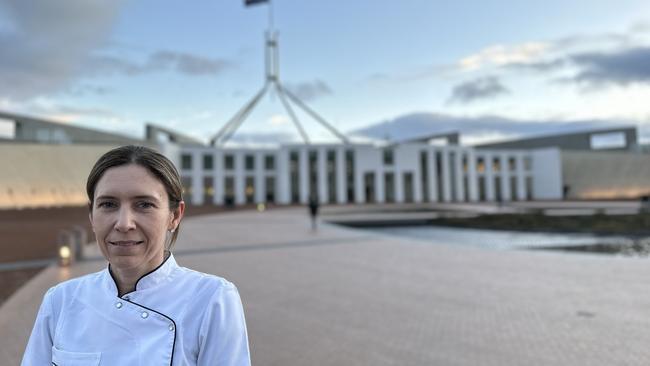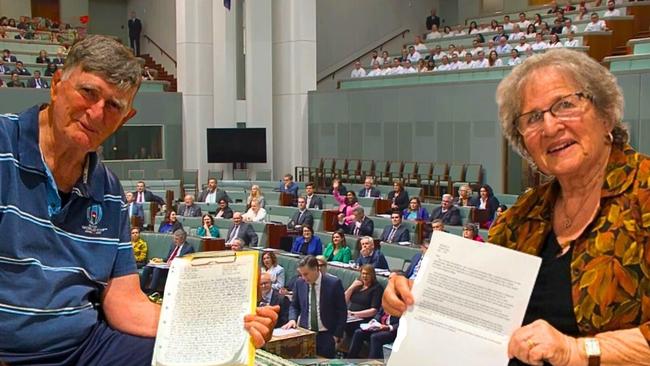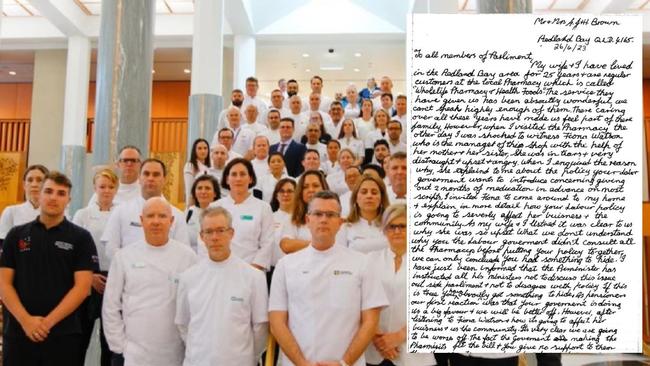When pain persists, go to Canberra: Pharmacists take pensioners’ anguish over prescription safety net to minister
An elderly bayside couple, who fear the September introduction of 60-day prescriptions will affect their annual discount safety net, had their complaint heard in Canberra last week.

Redlands Coast
Don't miss out on the headlines from Redlands Coast. Followed categories will be added to My News.
The plight of an elderly bayside couple, who fear the September introduction of 60-day prescriptions will affect their annual discount safety net, was raised with the federal Health Minister when angry Qld pharmacists stormed Canberra last week.
Redland Bay pensioners Ashley and Heather Brown fear they will not be eligible for the same number of discounted medications when changes to the Pharmaceutical Benefits Scheme start in two months.
Under the changes, after a pensioner has 36 scripts filled all subsequent prescriptions until the end of the calendar year will be free.
Mr Brown said under the scheme it would take him and his wife longer to reach the free “safety net” threshold as they would not get as many scripts filled.

Presently, only 30 days of medicine is able to be supplied to patients.
When that increases to 60 days the number of scripts a patient needs will be halved, as well as the number of trips they will need to make to the chemist.
Federal Health Minister Mark Butler said the move was designed to cut the cost and number of trips, to lighten the load for GPs and cut script co-payment fees charged by pharmacies.
“Accepting the advice of the Pharmaceutical Benefits Advisory Committee for two months’ supply of medicine will halve the number of visits so patients who are very stable in their condition and have been on these medicines for some time,’’ he said.
“They will be able to get a supply of their medicines with only one visit to the GP a year, instead of two, and only six visits to the pharmacist instead of 12.”
The Australian Medical Association of Queensland agreed.
It said allowing patients to receive two months of some medications would help ease pressures on GPs and cut costs for patients.
But Mr Brown, 76, said he did not believe the scheme would benefit him and his wife Heather over the longer term as it would take them longer to hit the free threshold.
He urged his local pharmacist Fiona Watson to take up his grievance with Mr Butler when she went to Canberra last week as part of a Pharmacy Guild of Australia delegation.

“While it sounds great on the surface, particularly for pensioners, on looking into it further, we could be worse off, as the chemist will have to start charging for other services that they currently do for free,” he said.
“Many pensioners in Redland Bay get their medicines delivered for free along with advice and their drugs put into Webster packs.
“Not only will cutting the number of scripts add extra cost the chemist can’t absorb, but it will also push us further away from reaching the free-script threshold.”
Redland Bay pharmacist Fiona Watson said she fully supported cheaper medicines but would have to streamline some free services to keep her business viable.
“Unfortunately, the unintended consequences of this policy will mean that many community pharmacies, like mine, will need to make cuts to staff and hours, and charge for things they currently do for free,” Ms Watson said.

“At Redland Bay, we do a large number of deliveries a month and they are currently free to the patient but we won’t be able to keep doing this after September.
“We also fill a large number of Webster packs and have charged the same fee for 15 years but we will have to increase that to make it viable once 60-day dispensing comes in.
“We currently only close three days a year but next year, I can’t see us opening on most public holidays.
“I don't want to charge but unfortunately we won’t have a choice.”
Ms Watson, who runs her pharmacy with her mother Evelyn and sister Shona and employs 20 locals, joined 70 other pharmacists from around Australia on the trip to Canberra to discuss the 60-day dispensing policy.
Pharmacy Guild of Australia said the group was well received in parliament even though “a number of politicians were not fully aware of the policy’s significant impacts on patients, particularly in regional areas.”





